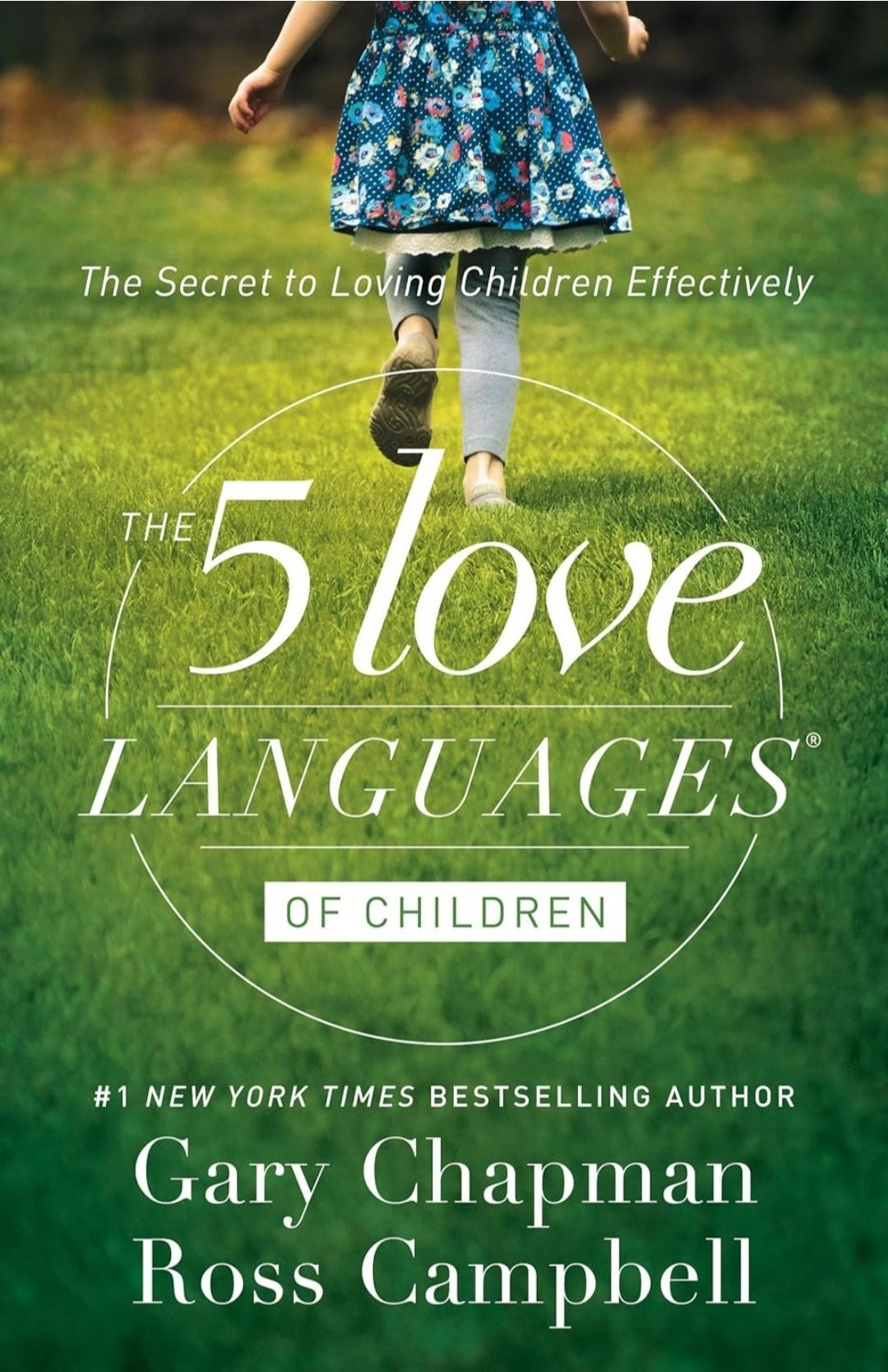Books to Love: The 5 Love Languages of Children
“It is easier to build strong children than to repair broken men.”
Frederick Douglass
The Five Love Languages of Children, by Dr. Gary Chapman and Dr. Ross Campbell, guides parents into better expressing love to their children by first understanding each child's unique way of giving and receiving love— his or her love language.
Some takeaways . . .
Children Need to Feel Loved First
We all love our children, but do they always know it or feel it?
Before parental teaching, modeling, guiding, or disciplining can be effective, children fundamentally need to feel that they are loved unconditionally. They need to rest in the security of their parents’ love, their “emotional tank” replenished regularly. And when the tank is depleted, children often express their deep needs through misbehavior.
Unconditional Love Does Not Spoil Children
Babies cannot be held too much; teenagers cannot receive too much sincere encouragement or pats on the back. And, no matter the preference, children of all ages need a healthy dose of each kind of love.
The Five Love Languages
The ways in which adults and children alike love and are loved can be categorized into:
Physical Touch
Words of Affirmation
Quality Time
Gifts
Acts of Service
Physical Touch
A child who best gives and receives love through physical touch will be the one jumping up to pinch, poke, surprise, wrestle, and bear hug you when you least expect it!
Parents can physically keep children's emotional tanks full with hugs, kisses, high fives, back rubs, holding hands, tousling hair, and playing backyard games and sports with their kids.
Boys and teens don't always receive as much love through physical touch from their parents, but they desperately need it just the same. And the authors write, “the more parents keep the emotional tank full, the healthier the child's self esteem and sexual identity will be.”
Words of Affirmation
The written and spoken word is powerful in conveying love. Parents can convey this with affection, appreciating who the child is. They can also give praise, reflecting on what the child does, such as behavior, attitude, and achievements, all aspects of a child's life over which he or she has a degree of control. Both kinds of affirmation can be uplifting to the child.
“I love you” is an abstract concept, isn't it? But these magic words are elevated with associating situations: spoken along with a hug goodbye, a goodnight kiss, a forgiving reconciliation after hurt feelings.
Besides telling children they love them, parents can also write notes of encouragement, praise specific actions such as when a child shows compassion or generosity, and focus on positive rather than negative reinforcement when trying to steer behavior. In other words, “let's do it this way” rather than always “don't” or “no.”
A gentle tone of voice and genuinely apologizing to the child when words become harsh are also essential to a loving parent-child relationship.
Quality Time
Kids who enjoy quality time with their parents don't really mind what activity they do . . . it could be cooking, chopping wood, running errands, playing at the park, reading aloud as a family, or taking a walk.
But far from trivial, these times represent opportunities for parents and children to relax, make eye contact, share thoughts and feelings, and have meaningful conversations.
And quantity matters, too. So many times busy parents overextend themselves to the point that there is little space left for downtime with children. But ultimately, what is the priority? Sometimes sacrifices need to be made and projects or hobbies need to be axed, in favor of giving children the precious, fleeting gifts of time and presence.
Gifts
Some children simply love receiving gifts because they are tangible, celebratory tokens of the parents’ love. These children enthusiastically enjoy all aspects of gifts: the anticipation, the opening, the oohing and aahing, and even the retelling about the gift to friends.
For gifts to be significant and express love, they should be freely given with no strings attached, rather than a bribe to motivate behavior.
There are many creative ways to give gifts to children besides toys: a special meal or snack, a personally made coupon for extra time with you on the weekend, a personalized gift with your child's name on it, a handmade ring or necklace, a song you make up for your child, a unique shell, stone, or feather from nature, or a special box to hold their treasures.
Acts of Service
Some children know their parents love them because their moms and dads simply help, serve, and take care of them with a loving spirit.
All parents are responsible for the feeding and sheltering of their offspring. But we can go beyond this by offering to fix a broken bicycle or toy, making flashcards to help them prepare for a test, treating them to their favorite home cooked meal on their birthday, helping them practice a sport, and so much more.
Something surprising I learned in this section was that some children ask for help in tasks not out of laziness or inability but out of genuine desire to feel loved by the parent actively helping them. They enjoy their parents coming alongside them, showing concern and engagement.
So the next time my girls ask me to help them pick out dresses to wear (which, at 8 and 10, they can easily do themselves), I’m going to realize that it's not about clothes. It's about me engaging with them . . . and now that I get it, I will happily comply. After all, I may not always be asked my fashion advice forever!
How Do I Know My Child's Love Language?
Children's preferences for how to give and receive love can be discovered if we're willing to look. Some suggestions from the book include:
Observing how your child expresses love to you and others
Listening to what your child requests most often
Noticing what your child most frequently complains about
Giving your child a choice between two options, such as “would you rather . . . ?”
Conducting an experiment in which you focus on one love language at a time and look for reactions
Misbehavior
Besides occasional issues caused by nutrition or sleep, childish misbehavior is most often due to an emotional tank that has run dry. Children make trouble or lash out, testing their parents with the unspoken question, “do you love me?”
Usually, parents’ gut reaction is, “how can I stop the bad behavior?” But the real question is, “what does my child need?”
From this perspective, we can see that our child may be begging to be held, enjoy more time with us, receive our attentive help, or hear praise from our lips. We must first fulfill the need of unconditional love before discipline and instilling values can be effective.
Learning
Children's emotional maturity affects everything: their ability to feel secure, socialize, cope with stress and change, motivate themselves, and learn. And because many children do not feel adequately loved, they “fall behind” emotionally, something most parents do not see.
What does this look like? Many children today are burdened with anxiety and depression, lacking focus, energy, and confidence. Eye contact is poor and they have trouble approaching both adults and peers.
Just like handling misbehavior, parents must ask the right question about poor school performance. Instead of, “how can I motivate my child?” we must first generously fill their emotional tank. Only then can a child begin to regulate her anger and take responsibility for herself in the academic realm.
Anger & Love
Like so many problems, anger can be prevented or healed with love. Parents can keep resentment, passive aggression, and rebellion at bay with love and wisdom: keeping their children's emotional tanks full and modeling and guiding children into channeling anger into something constructive. Mastery of anger is the point where we seek understanding, growth, and reconciliation.
The inability of a child to manage his anger is a main cause of rejecting parents’ values, authority figures, and even the authority of God.
On the other hand, mastering one's anger is fundamental to character maturity and flourishing in life.
And it's never too late to extend genuine love to one's children, no matter their age.
Marriage and Singleness
Loneliness, exhaustion, and a lack of support are just some of the burdens many single parents carry as they attempt to raise and love their children. In this situation, it is imperative that parents take good care of themselves physically, emotionally, and spiritually, actively seeking out support from friends, family, and the church community in order to have the emotional stores with which to love their children.
In marriage, cultivating a loving relationship is the most crucial thing we can do to love our children. We do this by respecting, admiring, and appreciating our spouse in the ways he or she needs.
We Would all Benefit from Expanding Our Expressions of Love
A mark of a mature adult is the ability to give and receive appreciation for others in all five love languages. How often do we fall short with the people in our lives!
And yet, knowing this, we can reflect on the myriad, simple ways to demonstrate our heart to those around us . . . and better articulate what we need from loved ones as well.
Overall, unconditional love, demonstrated in effective ways, fortifies a child's sense of security, worth, and place in the world.
Two of my very best memories from childhood are sitting in a hammock with my mom for hours in the cool Arizona evenings and receiving a beautiful card in which my mom simply wrote, “you are my perfect daughter—I love you.” Those two expressions of love are worth the world to me and are ones I have carried with me as treasures all these years. Thank you, Mamaw!
Let all that you do be done in love.
1 Corinthians 16:14
Until next time, happy reading! 📚
Liberty




